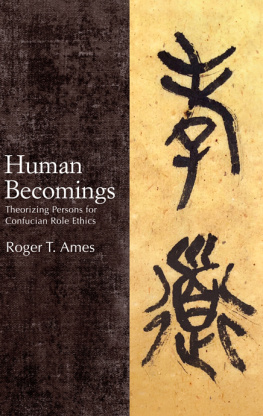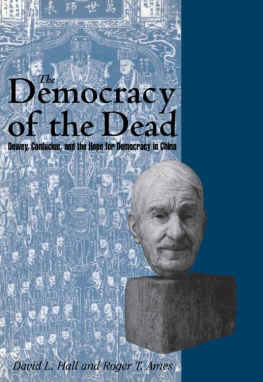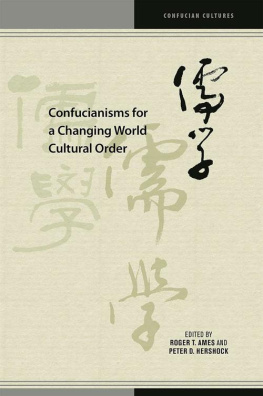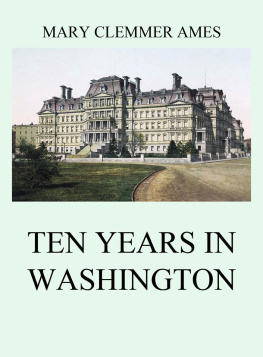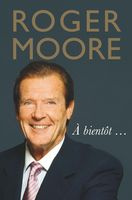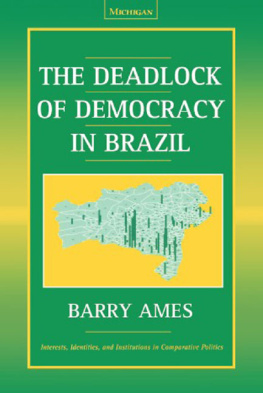Roger T. Ames - Human Becomings
Here you can read online Roger T. Ames - Human Becomings full text of the book (entire story) in english for free. Download pdf and epub, get meaning, cover and reviews about this ebook. year: 2020, publisher: State University of New York Press, genre: Romance novel. Description of the work, (preface) as well as reviews are available. Best literature library LitArk.com created for fans of good reading and offers a wide selection of genres:
Romance novel
Science fiction
Adventure
Detective
Science
History
Home and family
Prose
Art
Politics
Computer
Non-fiction
Religion
Business
Children
Humor
Choose a favorite category and find really read worthwhile books. Enjoy immersion in the world of imagination, feel the emotions of the characters or learn something new for yourself, make an fascinating discovery.
- Book:Human Becomings
- Author:
- Publisher:State University of New York Press
- Genre:
- Year:2020
- Rating:3 / 5
- Favourites:Add to favourites
- Your mark:
- 60
- 1
- 2
- 3
- 4
- 5
Human Becomings: summary, description and annotation
We offer to read an annotation, description, summary or preface (depends on what the author of the book "Human Becomings" wrote himself). If you haven't found the necessary information about the book — write in the comments, we will try to find it.
Human Becomings — read online for free the complete book (whole text) full work
Below is the text of the book, divided by pages. System saving the place of the last page read, allows you to conveniently read the book "Human Becomings" online for free, without having to search again every time where you left off. Put a bookmark, and you can go to the page where you finished reading at any time.
Font size:
Interval:
Bookmark:

Human Becomings
Human Becomings
Theorizing Persons for Confucian Role Ethics
Roger T. Ames

Cover: Xiaodao, the prime moral imperative in the Confucian tradition that references the intergenerational embodiment of a continuing culture. Calligraphy by Ni Peimin.
Published by State University of New York Press, Albany
2021 State University of New York
All rights reserved
Printed in the United States of America
No part of this book may be used or reproduced in any manner whatsoever without written permission. No part of this book may be stored in a retrieval system or transmitted in any form or by any means including electronic, electrostatic, magnetic tape, mechanical, photocopying, recording, or otherwise without the prior permission in writing of the publisher.
For information, contact State University of New York Press, Albany, NY
www.sunypress.edu
Library of Congress Cataloging-in-Publication Data
Names: Ames, Roger T., 1947 author.
Title: Human becomings : theorizing persons for Confucian role ethics / Roger T. Ames.
Description: Albany : State University of New York, 2021. | Series: SUNY series in Chinese philosophy and culture | Includes bibliographical references and index.
Identifiers: LCCN 2020023197 (print) | LCCN 2020023198 (ebook) | ISBN 9781438480794 (hardcover : alk. paper) | ISBN 9781438480817 (ebook)
Subjects: LCSH: Confucian ethics. | Human beings. | Confucianism.
Classification: LCC BJ1289.3 .A44 2021 (print) | LCC BJ1289.3 (ebook) | DDC 170.951dc23
LC record available at https://lccn.loc.gov/2020023197
LC ebook record available at https://lccn.loc.gov/2020023198
10 9 8 7 6 5 4 3 2 1
For the Berggruen Institute
Good People Doing Good Things
Contents
Chapter One
The Question of Which Questions to Ask?
Setting the Problem: Where Should the Discourse on Confucian Ethics Begin?
As I have mentioned in the introduction, the influence of G. W. F. Hegel as a philosopher, for good and for bad, has still not waned almost two centuries after his death. In his introduction to the Encyclopaedia Logic, Hegel reflects at great length upon the following questions: Where does philosophy begin? Where does the inquiry start? And in this reverie, he concludes that because philosophy does not have a beginning in the sense of the other sciences, it must be the case that the beginning only has a relation to the subject who takes the decision to philosophise. Darwinian) pragmatism. Within the philosophical narrative of his own tradition, Dewey challenges substance assumptions that commit us to a superordinate conception of discrete individuals and introduces his own radically disjunctive notion of persons as interpenetrating, irreducibly relational habitudes.
When we turn to Confucian ethics, we must begin from the expectation that within the ethical discourse of different philosophical traditions there have been significantly different assumptions about how the notion of person has been conceptualized. Heeding Hegels counsel to question the starting point of the inquiry, identifying and excavating these uncommon Confucian assumptions regarding persons might be a good place to begin. Indeed, taking the concept of persons as our starting point becomes a particularly apposite strategy when we consider what follows from it. That is, the cosmological assumptions that set the alternative interpretive contexts for the classical texts defining the Greek and the Confucian philosophical traditions need to be understood as a correlation between speculations about the life-forms and institutions that structure the daily lives of ordinary people and their respective interpretations of cosmic order. We need only to think of Plato who, in the Republic and the Timaeus, found a correlation between the harmony that orders the human soul in his formulation of political and cosmic order, respectively. This same assumption is at work in the interpretive studies by some of our most distinguished Sinologists. Nathan Sivin explores these correlations in his State, Cosmos, and Body in the Last Three Centuries B.C., and on the analogy of landscape paintings, Michael Nylan makes the argument for soft boundaries and multiple centers and perspectives within the evolving Confucian moral geography (dili ). In her monograph on Cosmology and Political Culture in Early China, Wang Aihe provides a succinct statement regarding this claim about the symbiotic nature of Chinese cosmology:
Such a correlative cosmology is an orderly system of correspondence among various domains of reality in the universe,
We can generalize in saying that our world cosmologies, grounded as they are in our alternative conceptions of what it means to become persons, are themselves a reflection of how different cultures have come to understand the human condition. In what follows, I will be relying heavily upon the open-ended process cosmology made explicit in the Great Commentary commentary (Dazhuan ) to the Book of Changes (Yijing ) as an interpretative context for reading and interpreting the classical Confucian texts. And I will be interpreting this cosmology as having evolved from earliest times in a contrapuntal relationship with an emerging, distinctive, and always changing human ethical, social, and political culture.
With respect to the mainstream discourse on ethics within the Western academy, we are turning a corner and are now at the happy juncture where we can anticipate that Confucian perspectives will be increasingly acknowledged and engaged by mainstream philosophers in the continuing conversation. And like my many colleagues who have been advocates for including Confucian resources in the debate, I also believe that this tradition has a significant role to play and a distinctive contribution to make. In this monograph I argue that the most important contribution Confucian philosophy broadly, and Confucian ethics more specifically, has to make to this conversation is to provide a robust alternative to the notion of the discrete and autonomous individual at a time when a foundational individualism has become a default position in most contemporary ethical discourse.
With respect to our understanding of Confucian ethics itself, there has been some debate among contemporary scholars working in this field over the appropriateness of categorizing this tradition as either a distinctively Chinese version of virtue ethics, or as a sui generis role ethics that belongs to the Confucian tradition itself. The choice between these classificatory alternatives again turns largely on excavating the conception of persons that is presupposed within the interpretive context of classical Chinese philosophy. If our goal is to take the Confucian tradition on its own terms, and in so doing to resist overwriting it with our own cultural importances, we must begin by first self-consciously and critically theorizing the Confucian conception of persons as the starting point of Confucian ethics.
It should be noted that we need the term role in the English expression Confucian role ethics to make clear the difference this gerundive notion of person has from other ethical traditions. But role is actually redundant when we turn to the Chinese language. That is, role is already presupposed in the Chinese translation of the term ethics itself as lunlixue , with lunli meaning specifically the quality achieved in the patterns of human roles and relations. Again, lun is not only used descriptively to mean roles such as king or husband but also has qualitative implications as exemplary or ignoble or caring or indolent, respectively. In this Confucian cosmology, categories of things broadly including that of human beings are to be constructed by correlating what they
Font size:
Interval:
Bookmark:
Similar books «Human Becomings»
Look at similar books to Human Becomings. We have selected literature similar in name and meaning in the hope of providing readers with more options to find new, interesting, not yet read works.
Discussion, reviews of the book Human Becomings and just readers' own opinions. Leave your comments, write what you think about the work, its meaning or the main characters. Specify what exactly you liked and what you didn't like, and why you think so.

